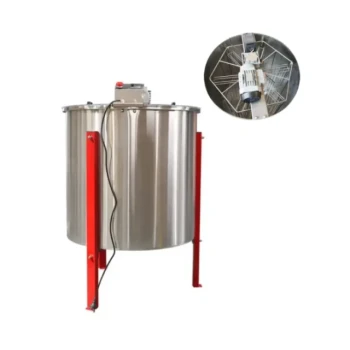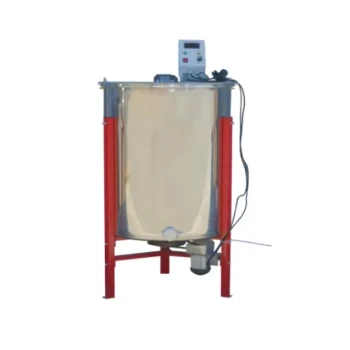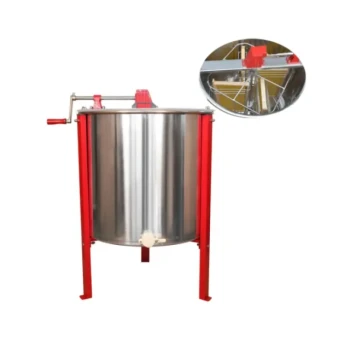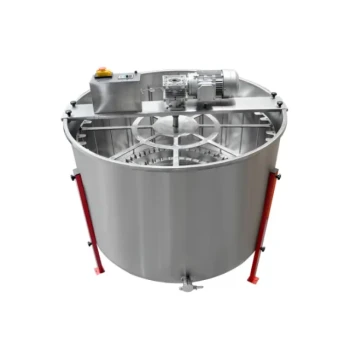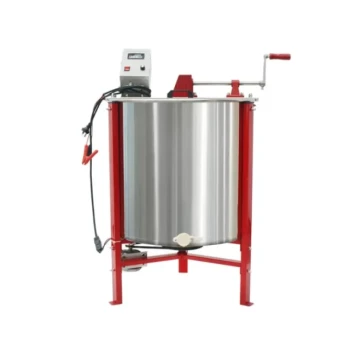At its core, the difference between a radial and a tangential honey extractor lies in how they position the honey frames for extraction. A tangential extractor holds the frame so only one side of the comb faces outward, requiring you to manually flip it to extract the other side. In contrast, a radial extractor positions frames like spokes on a wheel, allowing centrifugal force to extract honey from both sides simultaneously.
Your choice between a radial and tangential extractor is a decision about efficiency versus cost. Tangential models are affordable for small-scale hobbyists, but radial extractors offer a dramatic reduction in labor that becomes essential as your apiary grows.
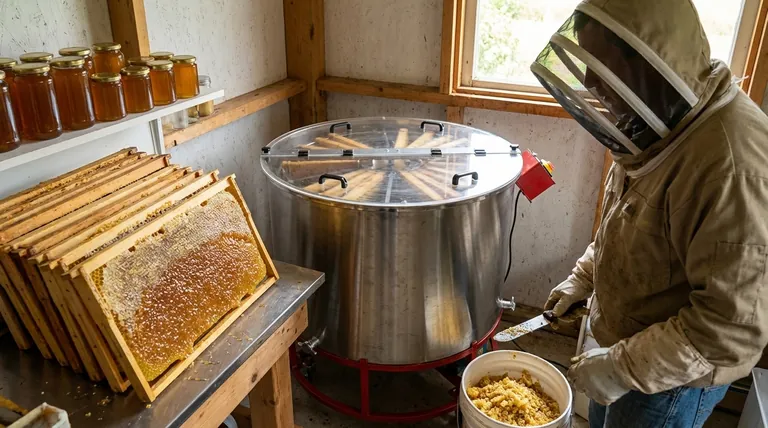
How Each Extractor Works
The mechanical orientation of the frames dictates the entire extraction workflow, including speed, labor, and potential stress on the honeycombs.
The Tangential Method: One Side at a Time
A tangential extractor holds frames in a cage with one flat side of the honeycomb facing the outer wall of the drum.
When the extractor spins, centrifugal force pulls honey out from only that outward-facing side.
To finish the job, you must stop the extractor, open it, manually flip each frame to expose the other side, and spin it again. This makes the process very hands-on.
The Radial Method: Both Sides Simultaneously
A radial extractor is designed so that the frames stand vertically with the top bar facing the outer wall. This arrangement resembles the spokes of a wheel.
As the drum spins, the centrifugal force acts on the frames at a perpendicular angle, pulling honey out of the cells on both sides of the comb at the same time.
This design eliminates the need to flip frames, making the entire process significantly faster and less labor-intensive.
The Practical Implications for Beekeepers
Understanding the mechanical difference is one thing; knowing how it affects you on harvest day is what truly matters.
Efficiency and Labor
A radial extractor is vastly more efficient. You load the frames, turn on the motor, and can walk away. There is no mid-process intervention required.
A tangential extractor demands constant attention. The cycle of spinning, stopping, opening, flipping, closing, and spinning again makes for a slow and laborious day, especially with more than a few frames to process.
Scale of Operation
For a hobbyist with only one or two hives, the extra time spent using a tangential extractor is often acceptable given its lower cost.
For any beekeeper with three or more hives, or for those who value their time, a radial extractor quickly becomes a necessary investment. The time savings are substantial and prevent harvesting from becoming an exhausting chore.
Potential for Comb Damage
With tangential extractors, there is a higher risk of "blowing out" the comb. If spun too fast initially, the weight of the honey on the un-extracted, inner side can break the delicate wax foundation. Beekeepers often must partially extract one side, flip, fully extract the second, then flip back to finish the first.
Radial extractors are generally gentler on the comb. The force is distributed more evenly across the top bar and the structure of the wax cells, reducing the risk of damage and allowing for faster spin speeds sooner.
Understanding the Trade-offs: Manual vs. Motorized
The choice between radial and tangential is often linked to the choice between a manual hand-crank or an electric motor.
Manual (Hand-Crank) Extractors
These are the most affordable and simplest option, requiring no electricity. They are perfect for off-grid apiaries or beginners on a tight budget.
However, they are powered by your physical effort. This becomes extremely tiring and time-consuming, especially when combined with the need to flip frames in a tangential model.
Motorized (Electric) Extractors
Motorized extractors are more expensive but offer a monumental leap in productivity. They provide consistent speed and free you from the physical labor of cranking.
Most radial extractors are motorized, as their design is already focused on efficiency. This combination provides the fastest and easiest extraction experience.
Making the Right Choice for Your Apiary
The best extractor is the one that aligns with the scale of your operation and your long-term goals as a beekeeper.
- If you are a hobbyist with 1-3 hives: A manual, tangential extractor is the most cost-effective and practical starting point.
- If you are a growing beekeeper (4+ hives) or simply value your time: A radial extractor, preferably motorized, is a worthwhile investment that will save you significant labor.
- If your primary focus is maximizing efficiency for a commercial or serious sideline operation: A large, motorized radial extractor is the only practical choice.
Choosing the right tool for the job ensures you can enjoy the rewards of beekeeping without being held back by the harvest.
Summary Table:
| Feature | Radial Extractor | Tangential Extractor |
|---|---|---|
| Frame Orientation | Frames like wheel spokes | One side of comb faces outward |
| Extraction Method | Both sides simultaneously | One side at a time (requires flipping) |
| Best For | 4+ hives, commercial operations, efficiency | 1-3 hives, hobbyists, budget-conscious |
| Labor Intensity | Low (set and forget) | High (manual intervention required) |
| Comb Damage Risk | Lower (gentler, even force) | Higher (risk of blowing out comb) |
Ready to Scale Your Beekeeping Operation?
Whether you're a commercial apiary or a beekeeping equipment distributor, choosing the right extractor is crucial for your productivity and honey quality. HONESTBEE supplies robust, high-efficiency radial and tangential honey extractors designed for the demands of wholesale-focused operations.
Invest in equipment that saves you time, reduces labor costs, and protects your valuable comb. Contact our experts today to discuss the best extraction solution for your business!
Visual Guide
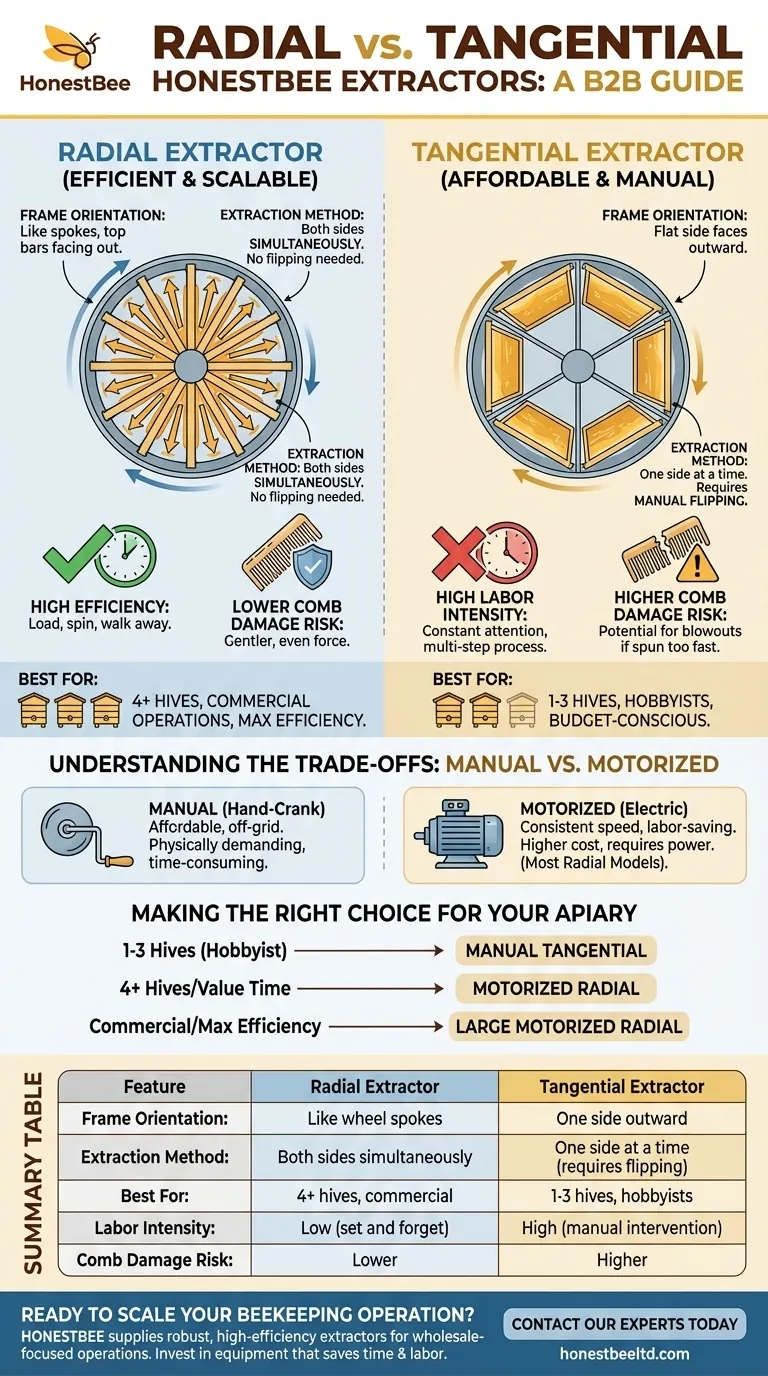
Related Products
- HONESTBEE 72 Frame Industrial Electric Honey Extractor for Beekeeping
- Stainless Steel Manual 8 Frame Radial Honey Extractor Machine for Beehives
- HONESTBEE 6 Frame Self Reversing Electric Honey Extractor for Beekeeping
- 8-Frame Electric Self-Reversing Honey Extractor Spinner for Commercial Honey Extraction Equipment
- Professional 4 Frame Self Reversing Electric Honey Extractor for Beekeeping
People Also Ask
- What are the main types of honey extractor machines available? Choose the Right Extractor for Your Apiary's Scale
- Should I get a manual or electric honey extractor? Choose the right extractor for your beekeeping scale.
- What are the main types of honey extractor machines? A Guide for Beekeepers
- Why is preserving honeycomb integrity important, and how do automated extractors help? Boost Hive Health & Honey Yields
- How have centrifuge honey extractors impacted honey harvesting? Boosting Efficiency and Sustainability


